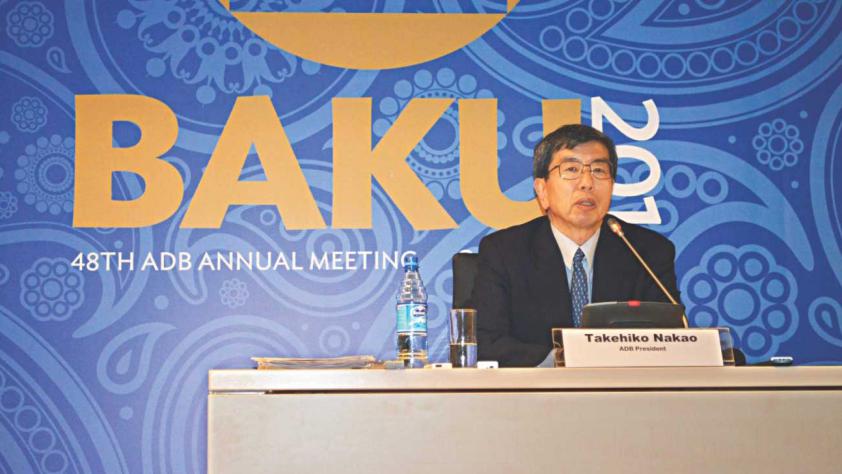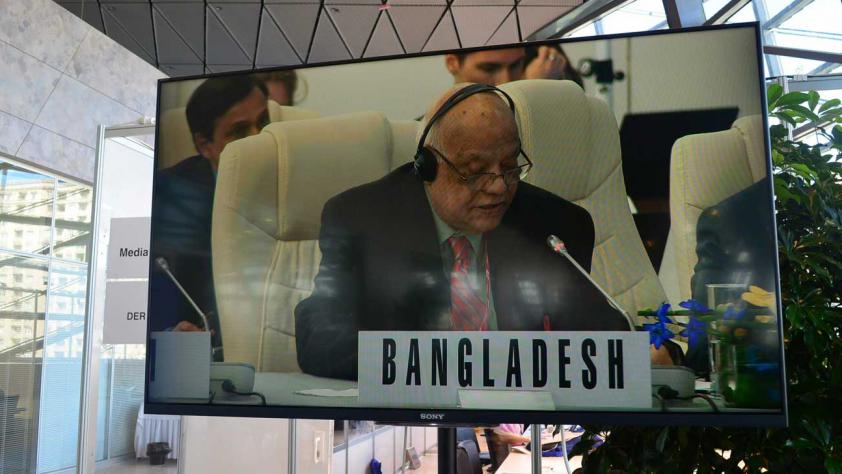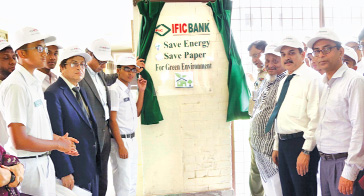ADB vows reforms to stay relevant
Its annual meeting in Baku comes to a close
 ADB President Takehiko Nakao speaks at the closing press conference on its annual meeting in Baku yesterday.
ADB President Takehiko Nakao speaks at the closing press conference on its annual meeting in Baku yesterday.
The Asian Development Bank is reforming itself to stay relevant to the region that it has served for about 50 years, as a rival in the same continent is gaining prominence.
The ADB dominated by Japan faces questions of its future relevance, with the rise of China-led Asian Infrastructure Investment Bank or AIIB.
Japan and the US own the largest shares in ADB, with over 15 percent each, and have sidestepped calls in the past that would pave the way for a larger stake, and greater influence, for China that has a 6.5 percent stake in it.
In the coming years, the development landscape is set to change. The AIIB, the first major multilateral development bank in a generation, provides an avenue for China to strengthen its presence in the world's fastest-growing region.
The AIIB has won backing from US allies, from Australia to the UK, confounding efforts by the administration of President Barack Obama to campaign against the institution.
ADB President Takehiko Nakao insists the two banks will not compete but complement each other.
“We will maximise cofinancing opportunities not only with our traditional partners but also with new partners,” Nakao said yesterday at a media briefing that capped the ADB's four-day annual meeting in Baku, the capital of Azerbaijan.
“We will collaborate and cofinance with the Asian Infrastructure Investment Bank, based on our shared understanding of the importance of safeguard standards.”
Battle or no battle between the ADB and AIIB, nations -- from Bangladesh to Vietnam -- stand to gain from the combined resources, as Asia's developing countries need about $8 trillion for infrastructure building until 2020.
So, to stay ahead in the game, the ADB has fused its soft and hard loan windows to boost lending capacity by 50 percent to $20 billion in 2017, while it will rise by up to 70 percent for poor countries.
The reform is seen as a springboard for policy changes across other multilateral agencies -- the World Bank and the International Monetary Fund.
Thanks to the merger, Bangladesh, loosely rated as a lower-middle income nation in the ADB's books, will qualify for more than the annual average fund of $1 billion, which is mostly spent on infrastructure.
“We will keep our focus on low-income countries, and those in fragile and conflict situations,” Nakao said.
The merger will give the ADB an opportunity to revisit the balance between country-based activities and regional and global pursuits; to redefine lending terms and eligibilities; and to better engage the bank's borrowers, whose economic success is not yet fully reflected in the bank's management and governance.
The ADB takes pride in reducing poverty in Asia over the past five decades. About 1.4 billion Asians, or roughly 40 percent of the region's population, remain poor, according to the ADB.
“This is unacceptable,” Nakao said.
“We also see inequalities increasing in many countries. Continued economic growth supported by sound macroeconomic policies and structural reforms will be key to poverty reduction. At the same time, we need to squarely address the issues of quality of growth and inclusiveness.”
The Manila-based lender that allocates 80 percent of its funds for infrastructure will continue to be an important financier of such projects in the region.
Nakao emphasises that infrastructure plays an important role in promoting economic growth and reducing poverty.
“We will do so by adhering to the best international practices on environmental and social safeguards,” he said. “We will pay greater attention to inclusiveness and sustainability of infrastructure investments.”
The ADB pledged to bolster support for education and health. “We will also help improve governance and capacity of our clients, deepen financial inclusion, and enhance food security and agricultural productivity.”
As part of its internal reforms, the ADB -- often blamed for sluggish work -- said it would continue to improve efficiency and effectiveness of its operations.
The ADB is delegating procurement authority to its resident missions -- a reform that Nakao said started to show results.
“We are reviewing resource and skills gaps. We will make the best use of our existing resources.”
News:The Daily Star/6-May-2015World Bank's pension investments clash with principles

The World Bank indirectly invests part of its $18.8 billion staff pension fund in companies in industries such as coal and tobacco, holdings that clash with the development institution's own calls for ethical and low-carbon investing.
In an internal post to staff seen by Reuters, the World Bank's treasurer said around 40 percent of the fund's equity holdings are actively or passively invested against equity index funds, which include companies in industries associated with environmental and health problems.
Two World Bank sources, who asked not to be identified, showed Reuters discussions between staff and managers on an internal site and a research note produced by employees. The note expressed concern about the pension and gave details of the holdings, questioning why the bank does not use socially responsible alternatives.
In its own lending practices across the developing world, the bank refuses to invest in tobacco production and has banned financial support for the construction of coal-fired electricity except for the poorest countries that lack other options.
The Washington-based bank's pension fund, details of whose holdings have not previously been reported, was ranked a "laggard" in transparency and managing climate risks in a report released this week by the Asset Owners Disclosure Project, which pushes asset owners to address climate change risks. It ranked lower than the pension funds of companies including British Coal and the state oil fund of Azerbaijan.
"It's very difficult for the bank to take a position where it is promoting sustainable growth and not managing the risks in their large portfolio - or telling anyone about it," said Julian Poulter, chief executive of the initiative.
While the pension fund is required to prioritize financial gains for staff, investment analysts said it could be directed into pre-screened or tailored funds that exclude companies that fail to follow sound environmental, social and governance (ESG) principles.
The bank's pension fund assets are held in a separate legal trust administered by its Pension Finance Committee (PFC), chaired by the World Bank's chief financial officer and including a mix of members from management, staff and retirees. External managers run the funds on a day-to-day basis. The PFC did not respond to Reuters request for comment.
The World Bank has a responsibility to manage the money "in the best interest of plan beneficiaries," the bank said in a statement to Reuters.
The bank said it does not comment on specific pension investments, adding that it opts for a "principled yet pragmatic approach" within the fund's overall requirements that considers ESG risks and opportunities "where material and relevant."
That is guided by federal law that requires a plan's investment policy to have the "exclusive purpose" of providing benefits to participants, though pension providers have flexibility on which investment principles to pursue.
The bank has called on others to divest from fossil fuel companies and its president, Jim Yong Kim, has asked long-term investors "to recognize their fiduciary responsibility" to reveal their exposure to climate change-related impacts.
The bank is conducting a review of its corporate sustainability policies, but says its pension fund investments are not included in that process because they have a separate governance structure.
Participation in the pension fund - a combination of defined benefit and 401k-style savings - is mandatory for World Bank employees. It has about 15,000 current employees and around 10,000 retired beneficiaries.
Not all beneficiaries are calling for change. Kenneth Lay, the vice president of the World Bank alumni group - the 1818 Society - said the fund should focus on maximizing returns.
While there is some evidence ESG investment can improve "risk adjusted performance," he said, "there is also extensive literature reaching the opposite conclusion."
Some of the pension's holdings are invested in the Russell 3000 index, which tracks 3,000 companies including coal producers Peabody Coal and Arch Coal and tobacco giant Philip Morris, according to the employees' research note.
Others are invested in funds tied to Morgan Stanley's MSCI index, which includes major fossil fuel companies like ExxonMobil, according to that note.
MSCI and other indexes offer portfolios that screen out companies in industries with perceived ethical problems.
Some of these funds have performed as well or better than the bank's current investments. The MSCI's two Fossil Fuels Exclusion Indexes have outperformed the main MSCI index for the past three years, according to annual performance fact sheets.
In its statement to Reuters, the bank said were it to consider such funds it "would have to be convinced of their superior return and risk properties in order to make the investment consistent with fiduciary responsibilities."
In a blog post on the bank's in-house Web site last October some employees argued that the bank's target of 3.5 percent annual real returns could be met through socially responsible investments, and raised concerns that the bank's pension investments contradict its public mission.
Bank employees have investment choices within their plans, but none offer ethical alternatives, they said.
In response, Madelyn Antoncic, treasurer of the World Bank, posted that "things aren't always black and white." She cited the case of a bio-medical subsidiary of tobacco company Reynolds American Inc. which is working to develop a vaccine for the Ebola virus from modified tobacco leaves.
Antoncic, who oversees more than $140 billion in World Bank assets as well as the pension fund, said that 60 percent of the plan's equity holdings are in separately managed accounts.
Several other large pension funds have shifted toward more ethical investments.
Norway's $850 billion Government Pension Global Fund, the world's largest sovereign wealth fund, announced in February that it had moved out of companies connected to Alberta's oil sands and gold miners. And the $53 billion staff pension fund of the United Nations invested in two low-carbon funds by BlackRock and State Street last December.
"Just two years ago, investments that met ESG principles were the domain of smaller funds; now interest has spread to the largest pension schemes in the world," said Kevin Bourne, a managing director of ESG at the FTSE Group, which last year acquired Russell Investments, creator of the Russell 3000 index.
News:The Daily Star/5-May-2015
Banks join hands with ADB for infrastructure funds
 Finance Minister AMA Muhith is seen on a screen as he speaks at the Asian Development Bank's annual meeting in Baku, the capital of Azerbaijan, yesterday. Muhith asked the ADB to function more from its field offices than from its headquarters. With a cumulative portfolio of $16.34 billion in loans and grants, the ADB remains a key development partner for Bangladesh, he said.
Finance Minister AMA Muhith is seen on a screen as he speaks at the Asian Development Bank's annual meeting in Baku, the capital of Azerbaijan, yesterday. Muhith asked the ADB to function more from its field offices than from its headquarters. With a cumulative portfolio of $16.34 billion in loans and grants, the ADB remains a key development partner for Bangladesh, he said.
The Asian Development Bank has signed an agreement with eight global banks to work together to advise governments on public-private partnership, a move aimed at accelerating the flow of funds into infrastructure projects in developing Asia.
Bangladesh is among seven Asian countries that ADB has identified as potential areas where 30 projects could be implemented at the cost of $20 billion.
The deal is the first formal co-advisory framework between a multilateral development bank and commercial banks, Ryuichi Kaga, head of ADB's Office of Public-Private Partnership, said at a media briefing yesterday on the sidelines of the lender's annual meetings in Baku, the capital of Azerbaijan.
ADB and the commercial banks will advise the Asian governments on how to best structure the PPP projects, make them attractive to the private sector and manage the bidding process. The governments will, however, make the final choice of PPP winning bidders.
Asia's developing nations need to spend $8 trillion until 2020 on infrastructure projects, mainly on energy, roads, railways, ports, airports and water, to keep up economic growth momentum. Growth in Asia and the Pacific remains strong, as ADB expects the region to maintain a growth rate of 6.3 percent this year.
Infrastructure such as transport, energy and water accounts for about 80 percent of ADB's operations.
Infrastructure is not only the basis for economic and industrial development, but also indispensable for human development, raising standards of living and reducing poverty, ADB President Takehiko Nakao said in a statement.
“The public sector alone cannot bridge the region's huge infrastructure financing gaps. Much larger investments from the private sector are needed. We must use public-private partnerships more effectively,” he said.
The region has a remarkable record of fighting poverty. But as recently as 2011, 544 million people were still living under the traditional poverty threshold of $1.25 a day. Last year, ADB developed a new poverty measure taking into account the consumption basket specific to Asia's poor, food costs that rise faster than the general price levels, and vulnerability to economic shocks and natural disasters. If the new poverty measure is applied, the number of absolute poor rises to 1.4 billion, or about 40 percent of the region's total population. “Such high poverty is unacceptable. Poverty must be defeated decisively, and soon,” Nakao said.
In an effort to eliminate poverty and achieve sustainable development in Asia, ADB found Japan, Canada and Australia as early partners in the PPP initiative.
The three countries are providing a total of $64 million to finance preparatory work for the PPP effort, while ADB will contribute $10 million. The combined outlay may climb up to $150 million, with more partners joining in. “Given their huge infrastructure needs, governments in Asia and the Pacific need more options for funding and operational efficiency in infrastructure projects,” Kaga said.
Although there is keen interest to attract private investment into infrastructure, many countries in the region struggle to prepare, structure and place the projects in the market in line with international best practices, Kaga told reporters. The eight banks that will work closely with the ADB are Bank of Tokyo-Mitsubishi UFJ, BNP Paribas, Crédit Agricole, HSBC, Mizuho Bank, Macquarie Capital, Societe Generale and Sumitomo Mitsui Banking Corporation.
ADB, with its co-advisors, will help clients assess the future income flows of projects, bring international best practices to PPPs, and develop PPP capacity in the region to deliver bankable transactions.
News:The Daily Star/5-May-2015IFIC Bank observes Earth Day
 A signage is being unveiled on Dhaka Residential Model College campus in the city recently, marking the Earth Day. IFIC Bank arranged the event.
A signage is being unveiled on Dhaka Residential Model College campus in the city recently, marking the Earth Day. IFIC Bank arranged the event.
IFIC Bank has recently organised a green event named “Green Generation Next” at Dhaka Residential Model College in the city, marking the Earth Day. The main focus of the event was to create awareness among the new generation about preventing environmental pollution and energy efficient habits in daily life. Noted poet Asad Chowdhury was present at the programme as the chief guest with Principal of Dhaka Residential Model College Brig Gen Md Asaduzzaman Subhani in the chair, says a press release.
News:Daily Sun/5-May-2015
Janata Bank waives loan interest violating rules

Janata Bank has waived interest of more than Tk30 crore in the last two years against some loans, violating the interest waiver rules.
The board of directors of the state-owned bank is waiving the interest on loans at a time while the government trying to recover it’s financial health by injecting more public money as capital support.
The government provided the bank with a fresh fund of Tk814 crore in the year 2013 as the bank was suffering from capital shortfall of Tk1,620 crore.
Moreover, Bangladesh Bank investigation has recently identified the provision shortfall of Tk318 crore during last year.
The board recently decided to waive interest of over Tk10 crore against the loan of BI Industry, debiting income account, which is subject to Bangladesh Bank’s approval, according to the central bank source.
Though Bangladesh Bank has denied extending its consent on this approval as, what it said, the board has the authority to take its own decision in this regard in line with the interest waiver policy of the finance ministry.
According to the interest waiver policy, the board of the bank could waive interest on loan subject to confirm the recovering cost of the fund. The policy does not allow any bank to waive interest on loans deducting income at any means.
Earlier, the bank had waived the interest of Tk8.45 crore against the loan of Goodman Pharmaceuticals in the year 2013 and also interest of Tk12.48 crore against the loan of Dhaka Hatchery.
The interest amount that has already been charged was waived debiting income, which was against the interest waiver policy of the finance ministry.
Meanwhile, Comptroller and Auditor General (CAG) has also raised objection over the move to waive the interest but the bank did not pay heed to it.
In an objection report over the interest waiver issue of Dhaka Hatchery, CAG said, “Bank owes Tk21.58 crore to the client against which mortgage property is worth Tk26.15 crore. As the amount of collateral is more than the debt amount, there is no way to waive interest by simply debiting income.”
Despite the objection, the bank waived the interest lowering the market price of property to Tk18 crore. A bank could charge interests and show in the income statement until the loan account is identified as substandard. Later, the charged interests are taken in the suspense account till the identification of the account as bad loan. After this stage, interest on loan remains to be charged.
According to the accounting norms, the bank could only waive interest from suspense account and the uncharged interest. However, the bank could not waive interest, debiting income by any means.
Though it is not required to get Bangladesh Bank’s approval in case of interest waiver, the board of the bank is trying hard to get formal approval of the authority for waiving interest of BI Industry’s loan in an attempt to put the blame on the shoulder of the central bank if any questions arise in future.
“Letters are being exchanged repeatedly between the two organisations, creating a situation where Bangladesh Bank is trying hard to avoid direct response over the case and the bank is strongly pursuing the central bank for getting its approval,” said a senior executive of Bangladesh Bank.
As contacted, Janata Bank Managing Director admitted the fact that it was not a right move to waive interest, by just debiting the income.
He, however, said the bank waived interest on loans after confirming recovery of the cost of fund. He would not detail anymore.
News:Dhaka Tribine/4-May-2015



